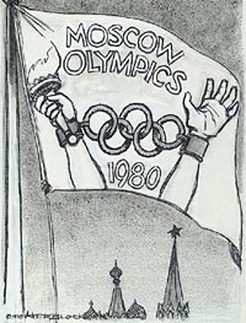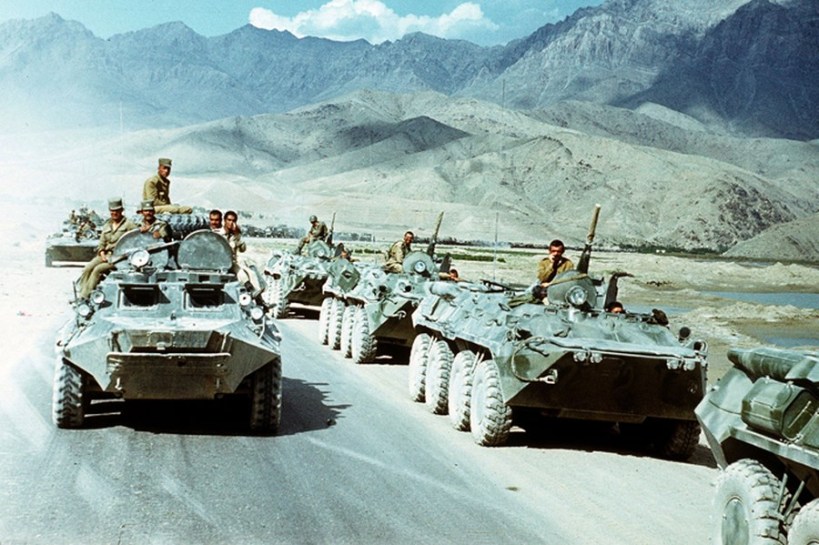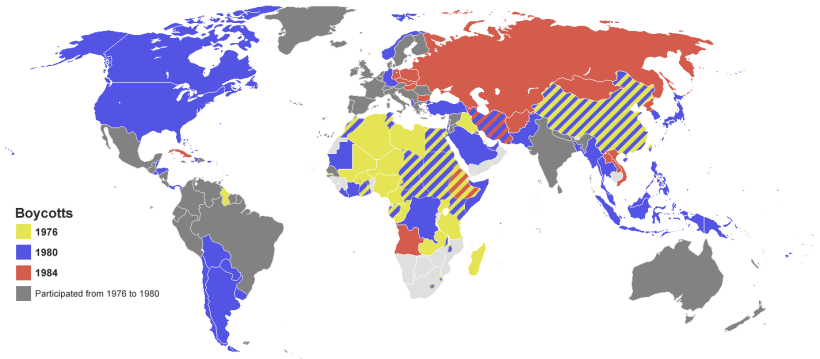When I think about the Olympic Games, I think of a world wide sporting event that has gone one since the late 1800s (and even earlier in Ancient Greece). I think of it as a time where rival nations can come together and compete in a way that shows respect for all nations. This was not always the case though, and even now I do have to admit it isn’t always the fairy tale picture that I make up in my head. I can wish though!

(here is a link to a video about how American althetes felt about the boycott in 1980)
The 1980’s Olympic Games held more than just a friendly rival between countries wanting to win various gold metals for their country. The Summer Olympic Games of 1980 were held in Moscow, this decision would alter the number of countries that would participate due to previous events during the late 1970s. On December 25, 1979 Soviet troops invaded Afghanistan. “The war, fueled by and fueler of Cold War anxieties, operated on the law of unintended consequences.”. When discussing the result of the invasion on Afghanistan, Gregory L. Freeze stated that it was “catastrophic: the Soviet Union found itself snared in a military quagmire that consumed vast resources, cost enormous casualties and had a devastating effect on the Soviet Union’s international position,”(Freeze, 446). This invasion caused an uproar by the United States and other nations. When the 1980’s Olympic Games took place in Moscow, the United States and 55 other nations held a boycott and did not participate. The invasion of Afghanistan led them to these decisions.

These boycotts made the International Olympic Committee outraged. In The Current Digest of the Russian Press, there was an article published in May of 1980 called the “Olympic Solidarity”. This document reflected the opinions and decisions made from the meeting of the International Olympic Committee’s Executive Board and leaders from different international sports federation. The main conclusion from the meeting was that the “Games in Moscow will be one of the most important events in world sports, and no dirty intrigues by the “boycott instigators” can prevent this.” The document also stated that “Another very important event was the unanimous adoption, by the meeting of leaders of international sports federations, of a resolution vigorously condemning attempts to boycott the Olympics, which are being undertaken for selfish political ends.” The committees thought these boycotts effected the athletes the most, and deprived them of opportunities. The International Olympic Committee and the other international sports federations stood behind the Soviet Union and wanted to protect it against anything. Although the United States and 55 other countries did not participate, the Moscow Olympics in 1980 were still a success. Venues were filled to near capacity and over five million tickets were sold. “The boycott thus failed to cast a pall over the 1980 Olympics, although it did deepen the atmosphere of Cold War.” It is quite humorous that four years later the Soviet Union and other Communist nations boycotted the Summer in Lost Angeles for “security reasons”.

Cover Image Found: http://nhd2016acdyslin.weebly.com
Freeze, Gregory L. Russia: a history. Oxford: Oxford University Press, 1997.
I wonder if the Soviet Union anticipated their international position when they decided to invade Afghanistan? It seems like they only received an overwhelming majority of negative feelings towards the invasion (at least from the West), which makes me wonder if relations would be different today (or even just in the years following 1979) had the Soviet Union not invaded. Good balance between writing about the Olympics & the invasion. Good post overall!
LikeLike
I thought you made a very interesting point about how the boycott affects the Athletes. Many Olympic only participate in a couple games at most and they spend years training. It would be tough being placed in their situation.
LikeLike
The Olympic games are always surrounded by current political tension, but they do offer a platform for international respect and remain an important indicator of foreign relations. As much as the invasion played into the boycott, the fact that communist Moscow would get international publicity was in itself a concern for the US. It is interesting that the event continued with a successful turnout and that the boycott tactic was later used by the Soviet Union. Nice post!
LikeLike
I found it very interesting that the boycotts barely had an effect on the turnout of the Olympic games. I thought that the boycotts would be another aspect of the downfall of the Soviet Union. However, after reading this article, I was surprised that the boycotts barely affected the USSR in a negative way.
LikeLike
Interesting post! I like how you related the Olympics to the invasion of Afghanistan. I also think it was interesting and did not know that the boycotts didn’t effect the turnout of the games with so many countries not participating.
LikeLike
Great post! I liked how you connected the Soviet invasion of Afghanistan with the United States boycotting the 1980 Olympics. As you mentioned, the Olympics are an event where countries can set aside differences and participate equally together. It’s crazy to think that boycotting the Olympics did occur.
LikeLike
Very well done post on the Olympics and the famous boycott. I love the map graphic and the informative video you included. It all helped to enhance the post!
LikeLike